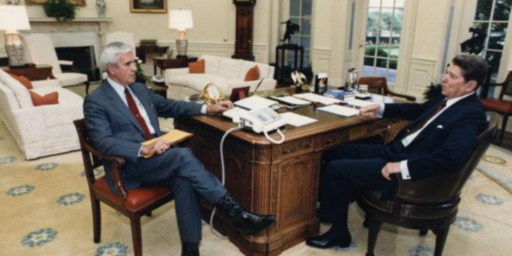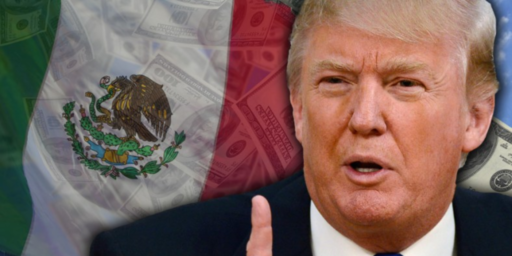Pete Domenici, Long-Serving New Mexico Senator, Dies At 85
Pete Dominici, who served as Senator from New Mexico for more than thirty years, died earlier this week at age of 85:
Pete V. Domenici, the former six-term Republican senator from New Mexico whose mastery of budget and tax issues and energy policy made him one of the Senate’s most influential members, died on Wednesday in Albuquerque. He was 85.
Steve Bell, his longtime chief of staff, said the cause was complications of abdominal surgery. Mr. Domenici died at the University of New Mexico Hospital.
He had long struggled with frontotemporal lobar degeneration, a progressive disease of the brain that causes forms of dementia. He announced in October 2007 that he would not seek a seventh term because of the disease. During his last full year in office, 2008, he often appeared visibly weakened in public appearances.
In 1972, Mr. Domenici (pronounced doe-MEN-ih-chee), a strong supporter of nuclear power in his home state, the site of the first atomic explosion, became the first Republican elected to the Senate from New Mexico in 38 years.
But he was little known nationally until 1981, when he was named chairman of the powerful Budget Committee in the wake of the Republican takeover of the Senate and Ronald Reagan’s landslide victory over President Jimmy Carter in the 1980 election.
A fiscal conservative, Mr. Domenici set out to help fulfill Reagan’s election-year promise to balance the federal budget. But it was a goal he would not achieve, as the federal deficit ballooned during the Reagan years.
Mr. Domenici supported the conservative theory that tax cuts stimulate economic growth. But he went on to grapple with the president himself, as well as with Republican colleagues in the Senate, on the long-term fiscal consequences of the White House’s proposed tax cuts and increases in military spending, questioning whether they might spur inflation and defeat any chances of balancing the budget.
Congress passed steep tax cuts in 1981, and critics of the legislation said the reductions only deepened the federal deficit and fueled a subsequent recession. Reagan agreed to a huge tax increase in 1982 to reduce the deficit, and the economy began to rebound.
Mr. Domenici also sparred with Democrats over their counterproposals to increase Social Security benefits and expand other entitlement programs.
In fiercely partisan and ideological budget debates during the 1980s, he was lauded for his steadiness and credibility in helping to draw the opposing sides together to reach budget agreements and enact them into law.
It was not until the boom years of the 1990s that Mr. Domenici, in concert with a Democratic White House under Bill Clinton, succeeded in writing two balanced-budget agreements, the first in more than four decades. In doing so he clashed with the House speaker, Newt Gingrich, a Republican, calling Mr. Gingrich’s proposed tax cuts under his “Contract With America” agenda fiscally irresponsible.
His bipartisanship made him one of the most respected members of the Senate. “Mr. Domenici enjoys a universal reputation as one of the Senate’s hardest-working, most intelligent and most intense members,” The New York Times said in an editorial in May 1995.
In a documentary film about Mr. Domenici made by a New Mexico PBS station, Senator Edward M. Kennedy, Democrat of Massachusetts, said: “There’s no one in the Senate, or in the House of Representatives, that can make the case like Pete Domenici can, and make it as convincingly and as powerfully as he does. And whenever he does, the U.S. Senate just responds overwhelmingly.”
Mr. Domenici spent four years as chairman of the Senate Committee on Energy after the 2002 midterm elections. He was regarded as Capitol Hill’s foremost authority on nuclear power and a friend to the industries that supplied and used nuclear generating equipment.
(…)
Pietro Vichi Domenici was born in Albuquerque on May 7, 1932. He was the youngest of six children and the only son of Cherabino Domenici (who was known as Choppo) and the former Alda Vichi. His parents, who were both immigrants from northern Italy, ran a successful grocery business, where their children helped out.
Mr. Domenici later resisted his party’s hard-line policy on border protection and immigration policy, in part because of an experience he had as a young man during World War II, when he witnessed his mother, an undocumented immigrant, being arrested at home, taken away in a black car and then briefly detained by the authorities, who were looking for Italian sympathizers. His father had become a citizen after serving in the Army in World War I.
Mr. Domenici attended the University of New Mexico, where he was a star pitcher on the baseball team, and graduated with a degree in education in 1954. He spent a year teaching junior high school science and math and then attended the Denver University law school, earning his degree in 1958. He married Nancy Burk, a physical therapist, that same year.
He entered politics in 1966, when he was elected to the Albuquerque City Commission. By then he had legally changed his given name to Pete. He ran for governor of New Mexico in 1970, winning the Republican nomination but losing to his Democratic rival, Bruce King. Two years later, he won his Senate seat handily.
In 2013, Mr. Domenici’s upright image was tarnished when it was revealed that he had fathered a child in the 1970s with Michelle Laxalt, whose father was Senator Paul Laxalt, Republican of Nevada. Mr. Domenici was 46 and Ms. Laxalt was 24 at the time of their relationship.
He and Ms. Laxalt disclosed the affair, they said, because they believed someone else was about to do so. Their son, Adam Laxalt, has been Nevada’s attorney general since 2015.
Besides his son Pete Jr. and Mr. Laxalt, Mr. Domenici’s survivors include his wife and their seven other children — Lisa, Nella, Claire, David, Nanette, Paula and Helen — 15 grandchildren, two great-grandchildren and two sisters.
In 2004 Senator Domenici wrote a book on the signature issue of his career, whose title made clear where he stood: “A Brighter Tomorrow: Fulfilling the Promise of Nuclear Energy.”
“In the 21st century,” he wrote, “nuclear power will be a major contributor to global peace and a better quality of life for both the developed and developing world.
“My ultimate goal is that in the year 2045, 100 years after the detonation of the first atomic bomb and the birth of the nuclear age, the world will evaluate the role played by nuclear technologies and conclude that their overall impact was strongly positive.”
Whether Domenici’s vision comes to pass or not remains to be seen, but his influence over politics during the time he was in office cannot be understated. Though he was considered a conservative for most of his career, he’d likely fall more into the moderate camp of the Republican Party today, but then that’s likely true for most of the other people who were considered “conservative” in his day and age, such as fellow southwestern Senator Barry Goldwater and President Reagan himself.






Requiescat In Pace